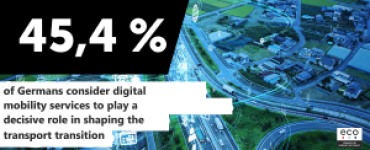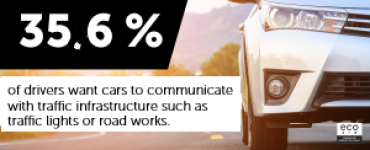- 60.8 percent of respondents reject the release of their mobility data
- Policymakers must create clear rules for the exchange of data as well as incentives for standardisation and increase the availability of public sector data
- Younger generation more open to shared mobility services
- eco study proves CO2 savings of up to 50 percent possible through connected mobility by 2030
The mobility of the future is digital, connected and available on demand. “For a sustainable mobility transition, a mobility ecosystem is needed that enables the sovereign and secure exchange of data among all actors involved. Only in this way can providers realise connected platforms that determine the most suitable means of transport and the most efficient route, taking into account real-time data,” says Oliver Süme, Chair of the Board, eco – Association of the Internet Industry, on the occasion of this week’s mobility summit of the German federal government.
Centralised service and data platforms could use artificial intelligence to determine the most comfortable and efficient route and optimally manage traffic flows. This also offers great potential for climate protection, Süme continued. By optimising traffic flows in urban car traffic alone, up to 50 percent of CO2 emissions can be saved by 2030 through connected mobility. This is the result of a study by Arthur D. Little commissioned by eco – Association of the Internet Industry. 1
“Unfortunately, however, we still see too little progress in implementation. Without meaningful data and its availability, connection and innovative progress in the mobility sector are almost impossible,” says Süme. The “Mobilithek“ and the Mobility Data Space are an important step in this direction. However, in order to promote the number of data holdings and the exchange, clear and proportionate rules for the exchange of data are finally needed, as well as incentives for standardisation and the establishment of data trustees, and the availability of public sector data must also be increased. The meaningful linking and smart evaluation of the growing amounts of data is the key to innovation and sustainable growth. However, numerous unanswered questions in connection with the use of data in an economic context still led to an innovation backlog.
Users are critical of data sharing
One reason for this is also the low user acceptance of digital mobility services. 87.5 percent of people in Germany are currently not using any smart shared mobility services. This is a finding of a survey conducted by eco – Association of the Internet Industry in cooperation with the market and opinion research institute Civey*, in which 2,500 people from Germany participated at the beginning of September. One reason for this reluctance could be the still widespread scepticism, especially in Germany, in connection with the use of personal data. However, more than 60 percent of respondents are not willing to share their mobility data with providers, even if it results in personal or community benefits.
9.4 percent would disclose their mobility data if it were associated with a benefit for climate protection. 8.6 percent of respondents have a positive view of data sharing if it saves them money. In addition to setting up data spaces, incentives and drivers such as climate protection and cost savings benefits should, therefore, also be the focus of communication. This can increase the acceptance and willingness of users to share data with the actors involved while complying with legal framework conditions. So far, the willingness to share data is particularly high only among students: 65.1 percent are willing to make their data available to mobility service providers without attaching conditions to it.
The immense potential of shared mobility concepts in the area of climate protection is illustrated by the study “The Smart City Market in Germany, 2021-2026“ by Arthur D. Little on behalf of eco.
1 Study “The Smart City Market in Germany, 2021-2026“ by Arthur D. Little on behalf of eco
*The opinion research company Civey surveyed 2,500 people between 8 and 9 September 2022 on behalf of eco. The results are representative of the inhabitants of Germany aged 18 and over. The statistical error of the overall results is 3.6 percent.
Survey graphics for download (in German only)
Which of these new mobility services offered via digital platforms do you use from time to time?




